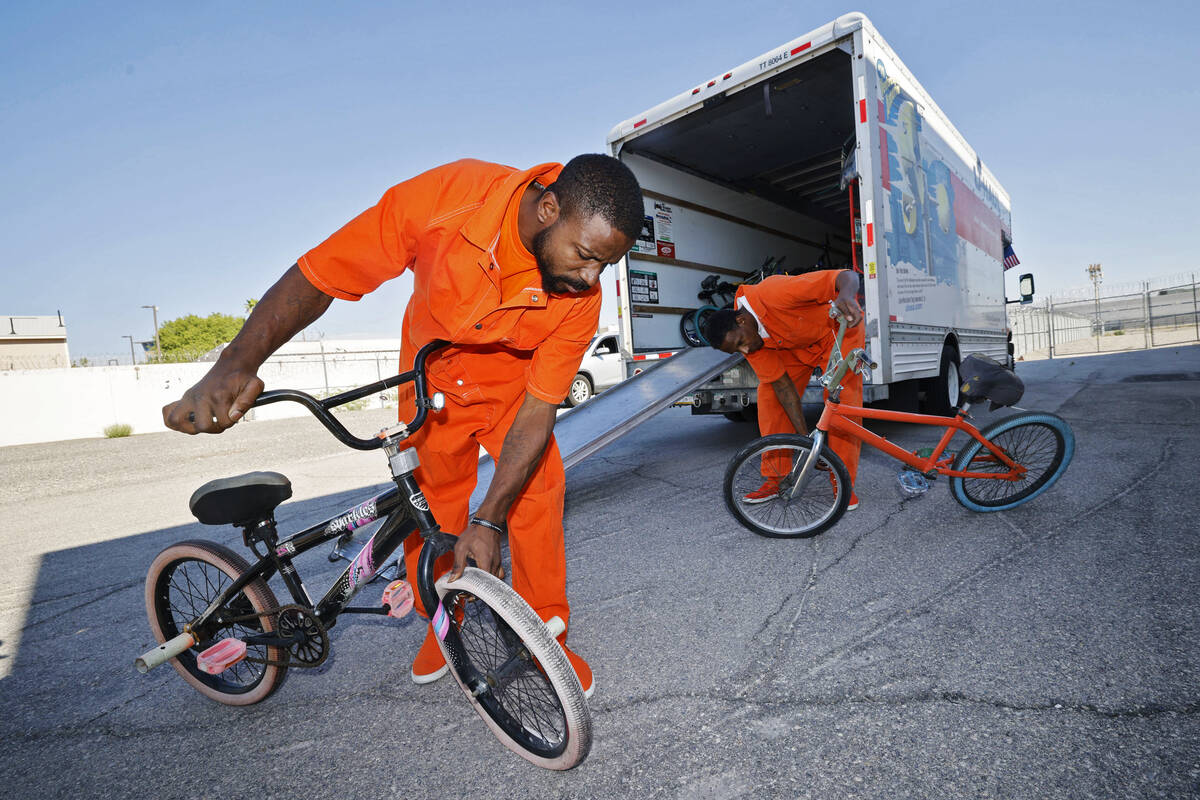‘Something positive’: NLV inmates repair bikes to give to veterans

Several inmates at the North Las Vegas Community Correctional Center are helping give back to the community by repairing broken bicycles to be given to veterans.
The National Bikes 4 Vets, a local nonprofit organization, picks up unclaimed bikes from police departments across the Las Vegas Valley and covers the in-house repair cost. Once they’re fixed up, they are donated to veterans, kids and to those struggling with homelessness.
On Tuesday, inmates gathered around Scott Black, a North Las Vegas councilman and mayor pro tem, as they evaluated what each bike needs to get running again for a veteran. A mountain bike on a bicycle stand, for example, needed brakes.
Metaphor for life
Black offered some encouraging words to the inmates as he surveyed the bike repair operations.
“I think bikes are a metaphor for life,” he told the inmates before he left to attend another community event.
“When the headwinds are hard, tuck your head down and keep pedaling where you want to go and the bike will take your there.”
The bicycle repair effort is part of the correctional center’s I Am Possible program.
Jurea Williams, the community services specialist at the center, started I Am Possible in February 2021.
It is designed to help a small group of inmates with substance abuse issues by providing therapy focused on how to re-adapt to their environment and “how to be OK with feeling,” said Candice Hill, the center’s substance abuse counselor.
Gwendolyn Strain, founder of the National Bikes 4 Vets nonprofit, uses money from her Social Security check to pay for the cost of basic parts such as inner tubes, tires and brake wire.
On a recent weekday, inmates waited for Strain to pull into the correctional center with a U-Haul loaded with bikes.
Five inmates rolled the bikes into the multipurpose building that once housed the most violent inmates in North Las Vegas, Williams said.
The multipurpose building now holds bikes in cells, and its stairs bear inspirational quotes to encourage inmates during their time in the I Am Possible program.
Strain drops off the bikes on a Tuesday and picks them up in two weeks while in the meantime also stocking up on bikes that can be repaired.
One of her helpers, 42-year-old veteran Paul Krah, is well aware of how important a free bike can be to someone in need.
Krah said that when he came back home from serving in the Marines, he struggled with substance abuse and ended up in jail over a year ago.
“It’s easy. I’ve been on the wrong path. I know what that’s like,” he said.
After being released from the Clark County Detention Center over a year ago, Krah said he lost everything and recalled thinking that he needed a bike.
Krah said he reached out to Strain when he heard about the nonprofit group giving free bikes to veterans. When Strain answered his call requesting a bike, she asked if he was free to help her for the next three hours. In that time she fed him and then they went to rent a U-Haul to get roughly 80 bikes.
He has been by her side since then to help her with the bike donations. and, Krah noted, he is now also an assistant manager at a U-Haul store.
OK to be a little selfish
Williams and Hill hope to expand the I Am Possible program.
Currently, each class cannot have fewer than five inmates at a time and are not co-ed, Hill said, noting she hopes that the program can grow to take on more inmates per class.
Inmates are less likely to re-offend if they graduate from the program, Williams said.
Of those who finish the program, only 18 percent of inmates return to jail compared with a 35 percent recidivism rate for those who drop out of the program, she said.
The program lasts for five weeks, with inmates working with Williams and Hill seven days a week. The current class of six will graduate Monday at the correctional center.
Inmates in the program are grateful to do something for others although they are not forced to work on the bikes, Hill said.
She also noted that the I Am Possible program encourages inmates to be a bit “selfish” about their recovery process in order to be successful. She said inmates often put a lot of effort toward other people and their needs and neglect their own.
The bicycle program, she said, has been a positive force for the inmates.
“For my guys, it keeps them productive and just realize that they’re accomplishing something for someone else,” Hill said.
“They are taking their personal issues and they’re putting it into something positive for the environment.”
Contact Jimmy Romo at jromo@reviewjournal.com or call 702-383-0350. Follow @jimi_writes on Twitter.